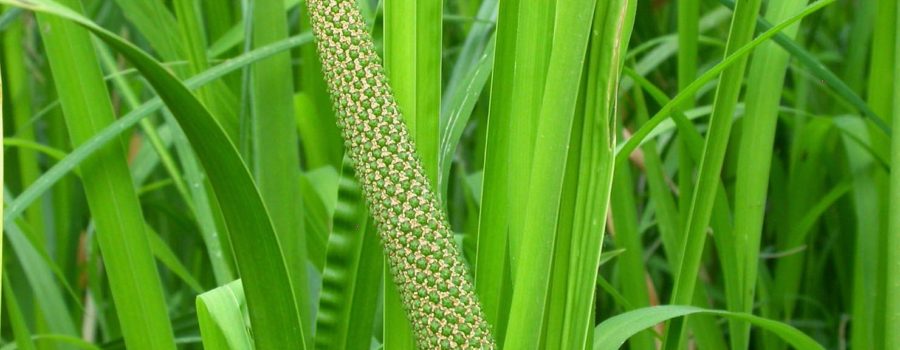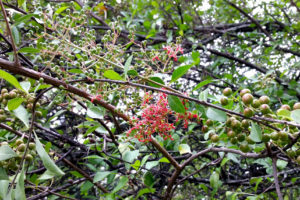For those who have heard the sound of God walking in the garden in the cool of the day, there can be no better experience on this side of eternity. It is unfailingly a time of restoration and delight, a period of encouragement and astounding beauty. Indeed, it brings the summum bonum within the reach of the lover and incites a worship of exuberant proportion. All what is necessary is the Beloved, the lover, and the inviting beauty of a garden.
So far we have seen that pomegranates, fragrant henna, exquisite spikenard, and aromatic saffron are lovely to God and should be thriving in our life. But there are other plants that are as pleasant and amazing as the one we have seen hitherto.
The calamus.
The calamus referred to in the Song of Solomon is the Acorus calamus L. (Araceae), an aromatic reed growing in wet areas such as the edges of ponds, lakes and rivers. In similarity with the cattails its leaves are sword shaped and can reach one meter high (three feet). They are directly attached to the rhizomes, which run horizontally beneath the soil. When bruised, the blades release a pleasant scent. For that reason they were often spread upon the floor of modest houses during feasts and weddings, or used in the fabrication of transient mats to diffuse their sweet aroma when crushed by the feet.
Although the leaves of the calamus were appreciated, today its main value resides in its rhizomes which have an atypical sweet aroma. They are still used in perfumery as an oil carrier of high quality and are employed to produce cosmetics. The calamus—in Hebrew קנה qaneh—was one of the five ingredients used in the making of the holy anointing oil (Exodus 30:23), a perfume which reproduction was forbidden under the Mosaic Law (Exodus 30:32).
What the calamus teaches us
One of the things we can learn from the calamus is the importance of our roots. Although hidden from the observing eyes, and often considered less important for that reason, our roots are the most fundamental part of our Christian life.
The Scripture reminds us that “if the root is holy, so are the branches” (Romans 11:16). To attempt to sanctify the branches while paying little attention to the roots is an attempt doomed to shipwreck on the shore of spiritual laws. No wonder the apostle Paul insists on the importance of being rooted down before being built up, “rooted and built up in Him” (Colossians 2:7). At times we are so busy getting the attention of the public eye that we neglect that hidden part which brings stability and life to the whole.
The roots of understanding
The Bible says, “Wisdom is the principal thing; therefore get wisdom. And in all your getting, get understanding” (Proverbs 4:7). To have our head full of Christian data would be of little use if we lack understanding. And there can be no understanding if the heart is not rooted in love, “that Christ may dwell in your hearts through faith; that you, being rooted and grounded in love, may be able to comprehend …” (Ephesians 3:17–18). Our ability to comprehend is mostly related to our root, not to our head.
The person who is rooted in love is rooted in Christ; and when a Christian is rooted in Christ his root becomes wonderfully aromatic.
If we truly want calamus in our garden it is imperative to put due importance on our rhizomes, i.e., on that side of life hidden from the public eye but naked and open to the eyes of Him to whom we must give account (Hebrews 4:13).
The second practical lesson
As we have read previously the root determines the quality of the leaves. In the case of the calamus the blades are aromatic because the rhizome is fragrant. Therefore when the former is trampled under foot and bruised by the crushing, a pleasant scent is dispersed, revealing the genuineness of the marsh reed.
The question here is the following? How do we react when God causes men to ride over our head? (Psalms 66:12). Which smell do we release? Do we bless when being reviled (1 Corinthians 4:12)? Can we pray and say: “Father, forgive them, for they do not now what they do”? (Luke 23:34). Do we disperse in such occasions the perfume of Christ or the stench of rotten flesh?
Cinnamon
The next plant the Beloved mentions is the cinnamon (קנּמנן the laurus cinnamomum, also named cinnamomum verum). The tree can reach thirteen meters in height but will rarely reach that size since it is harvested every two years, that is, cut down to ground level. The inner bark of the fresh shoots is being used to produce both the spice and aromatic oil.
While the spice is produced by simply drying the inner bark, the fragrant oil is made by roughly pounding the bark, macerating it in sea water, and then distilling the whole. The result is a golden-yellow oil with the characteristic odor of cinnamon and a very hot aromatic taste. As the calamus, the cinnamon oil was used in the making of the holy anointing oil (Exodus 30:23).
Something to learn from the cinnamon
As I mentioned earlier, the cinnamon tree never becomes very tall since it is cut to ground level every two years. The strength of its usefulness resides in its constant renewal, i.e., in its shoots. This is why the plant never becomes old. Its glory is always fresh (Job 29:20), and its youth always renewed (Psalm 103:5).
The Scripture reminds us time and again how important our renewal is. “Even though our outward man is perishing, yet the inward man is being renewed day by day” (2 Corinthians 4:16); “and be renewed in the spirit of your mind” (Ephesians 4:23); and again, “put on the new man who is renewed in knowledge according to the image of Him who created him” (Colossians 3:10).
To provide cinnamon we must accept to be cut down, and cut down perpetually. The cinnamon shoots might be little impressive, yet they yield glory.
If you think this post can help somebody else you can share it with the options presented bellow.













